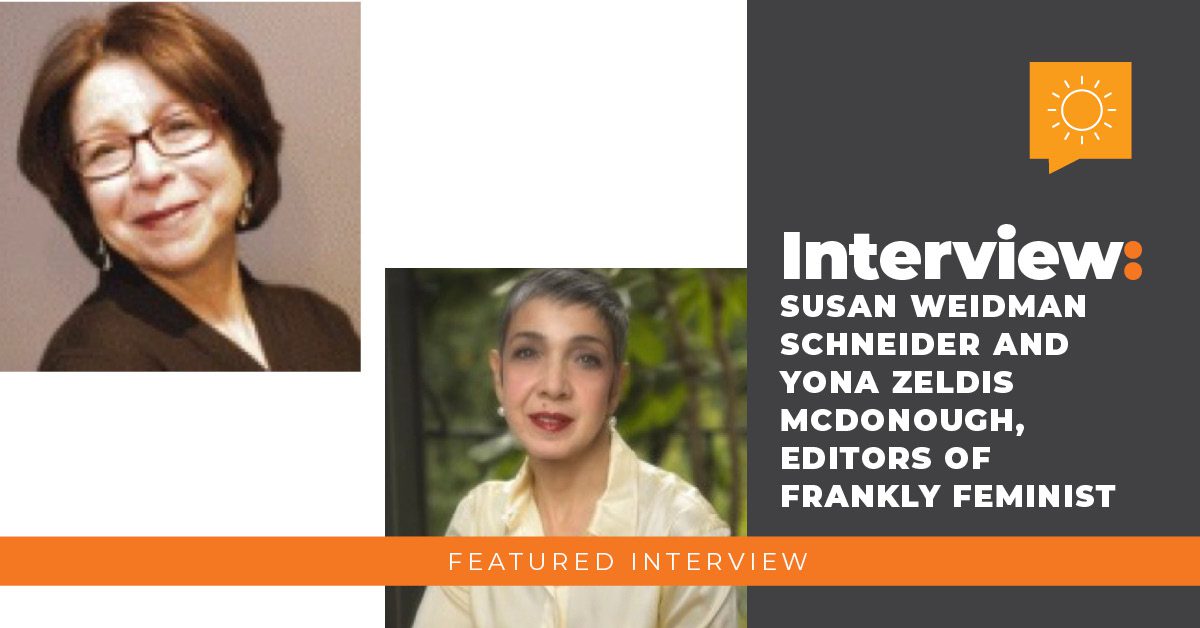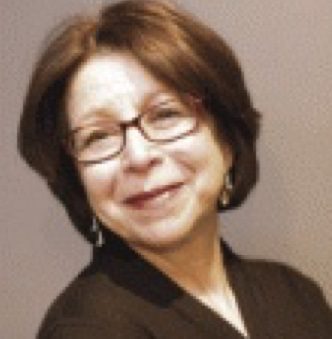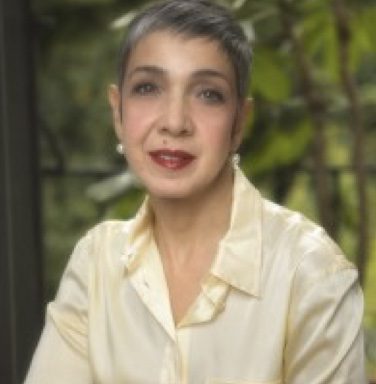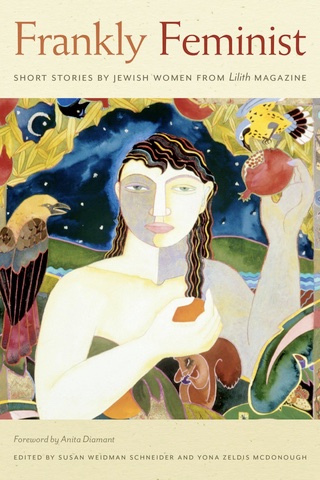Q&A with Editors Susan Weidman Schneider and Yona Zeldis McDonough
By Sarah Kloth

Frankly Feminist is a collection of some of the best short stories published in Lilith Magazine’s 45 year history. What inspired this particular collection? What are the themes featured and how are they relevant today?
Susan Weidman Schneider: There are several motives to our creating this anthology. No matter when they were published, so many of the subjects in these stories resonate with our concerns right now, almost as if they were ripped from today’s headlines—the assaults on women’s bodies; wars and their effects on women; making sense of intimate relationships that transgress social norms; confronting both misogyny and antisemitism, just as some examples.
And then…these stories have an even greater impact when they’re gathered together, and can be read in relation to one another. We have grouped the stories into categories like XXXX and YYYY so that readers catch the interplay between them. For example, what might be underlying connections between a story about a mother of 7 (CHK) planning an abortion and the self-determination of a sweatshop worker who fight back against a rape attempt by becoming a successful sex worker. Or a story about a soon-to-be-married Orthodox woman drawn to her non-Jewish co-worker and a psychotherapist drawn to a fraught out-of-office relationship with one of her patients.
And a third motivation is our absolute conviction that each of these stories has huge merit on its own and should be showcased in an anthology. As we point out in the introduction, these are all very “modern” stories, even the ones set a century ago. They don’t wrap up neatly. A story about a Black Jewish woman marching for racial justice in Washington DC leaves the reader pondering what changes the decades have wrought in our lives. In another story, a very young, very reluctant Persian bride on her wedding night, when she surprises both herself and the reader by its outcome.
Yona Zeldis Mcdonough: We believe that we publish some of the most original and exhilarating stories out there today and we wanted to bring this stellar work to a wider audience.
Who is the target audience for this book? Does it have an ideal reader?
SWS: The target audience is anyone who enjoys short stories and smart literary fiction. And anyone who follows benchmarks in the lives of Jewish women and girls across a wide range of backgrounds, eras and identities. The target audiencefor Frankly Feminist cuts a pretty broad swath: readers interested in compelling narratives, cultural identity, female development, feminist politics, religious practices—and much more.
YZM: We see this as a book that will appeal to lovers of short fiction in general, and Jewish-themed fiction in particular. But we also think that it will appeal to readers seeking a feminist perspective and that it will be well-suited to college courses and reading lists.
There are so many perspectives and points of view featured in Frankly Feminist including Persian Jews, suburban American teens, Eastern European academics, an immigrant, a Black Jewish marcher and more. Can you discuss the range of voices in this collection?
SWS: One of the aspects of Lilith’s new anthology that really thrills me is what I learn each time I read through these stories: that we have built a very big tent to hold Jewish feminist voices. Which is as it should be! No one voice here represents the whole, but the stories interact with one another, like the tiles in a mosaic or the instruments in orchestral music.
The composite of these experiences is exciting, and so are the individual experiences and perceptions of characters who may feel familiar and also very much unlike me.
YZM: It was our aim to include as many voices as we could, and we made our selection with that firmly in mind. There is no one way to be or experience life as a Jewish woman, and the stories reflect the nuances and distinctions within our shared experience.
This collection discusses so many important topics like gender, abortion, aging, and race. How would you say the issues facing jewish women mirror the issues facing all women? To what extent?
SWS: Well, let’s start from the beginning of this list:
Gender: Judaism through the ages has held very different roles for women and for men—the rules about who is obligated to pray at certain times of day, for example, which mostly do not apply to women and end up casting females as “other.” At the same time, Jewish practice has honored learning and scholarship, which meant that girls and women sometimes had to push themselves forward, not always successfully, to be the recipients of this learning. Some of these religious role divisions translated into secular life as well, but—for the most part—around the world, Jewish girls and women have been among the best educated in their communities.
Abortion: Jewish laws are clear: the life of the mother takes absolute precedence over the life of the fetus. The belief that life begins at conception is alien to Jewish thought. No surprise that Jewish women have been in the forefront of movements for reproductive justice. And now, with modern repro technologies widely available, there is more reason than ever before for Jews to make sure that IVF is legal and accessible. (All those years of education mean that Jewish women may choose to have children at a later age than women of other groups, which means that they are likelier to use Assisted Reproductive Technologies like IVF in larger numbers than other women.) Stories in this collection spotlight abortion, fertility challenges, decisions not to become a parent, and more.
Aging: This is a tough one. Older Jewish women—whether they have children or not, face the same worries that many women do as they age. Will I be able to hang on to as much of an independent life as I can? How will I negotiate solitude as my friends die, move away, become less able to connect in person? Technology has eased some of these worries, and the pandemic has been an unwelcome prep course for the isolation of aging. The stories in this collection deal with the push-pull of dependencies, like being a caregiver––and here as well gender roles come into play. One interesting thread I think many readers will appreciate: sons who are not sensitive to their mothers’ emotional needs while wanting to provide for them materially.
Jewish life in reality has become much more diverse than was the case a generation ago, with a fuller recognition that Jews come in all colors, just as we come in all genders and all levels of abilities. Race consciousness is not common in other collections of Jewish fiction. Several of the stories here deal with privilege or its absence, and race becomes one part of this, and would likely not have appeared in a Jewish fiction collection even five years ago.
YZM: These are most certainly issues that face all women, and will face all women in the future. That we bring a Jewish lens through which to view these topics doesn’t diminish their universal importance.
What sort of impact do you hope these stories make with readers? What will they walk away with?
SWS: An appreciation of the varieties of Jewish feminist experience as it’s refracted though stories told by women. And this has been the goal of everything Lilith has published over the past almost-50 years!
YZM: Oh, where to even begin! We hope readers will come away informed, inspired, delighted, but also deeply moved and sobered. The sheer variety of the voices almost guarantees that some if not most of them will resonate with our audience.
How do these stories represent Lilith Magazine’s rich 45 year history and what can your audience (new and old) expect from this collection?
SWS: The title of the book comes\ from the Lilith magazine’s tagline: “independent, Jewish & frankly feminist.” We hope that readers of our fiction collection Frankly Feminist will come away with new perceptions, see new possibilities, and view with empathy the lives of women like and unlike themselves. And this is what motivates us in assigning, editing and bringing to the public the personal essays, bold reporting, and original creative writing and art we strive to bring readers in each of Lilith’s award-winning issues.
YZM: Lilith has never been afraid to explore topics that are provocative or difficult, and this has been true of all the fiction published. We believe that fiction allows us a safe space to examine what is complex, disturbing and upsetting; we come away from the experience with a deepened sense of our own humanity.
About Lilith Magazine
Independent, Jewish & Frankly Feminist
Since 1976, Lilith’s mission is to be the feminist change-agent in and for the Jewish community: amplifying Jewish feminist voices, creating an inclusive and positive Judaism, spurring gender consciousness in the Jewish world and empowering women, girls and trans and nonbinary people of every background to envision and enact change in their own lives and the larger community. For more information, visit https://lilith.org/.

Susan Weidman Schneider, one of Lilith’s founding mothers, has been editor in chief since the magazine launched. Her writing about Jewish women’s philanthropy, the Jewish stake in abortion rights, the persistence of gender stereotyping and more have been credited with moving the needle on feminist change in the Jewish world. She’s the author of Jewish and Female and Intermarriage, and co-author of Head and Heart, a book about money in the lives of women.

Yona Zeldis McDonough , (aka Kitty Zeldis) is the award-winning author of nine novels and over thirty-five books for children. She is also the editor of two essay collections, and her short fiction, essays and articles have appeared in numerous national and literary magazines including Frankly Feminist.

Frankly Feminist
Short Stories By Jewish Women From Lilith Magazine
Edited by Susan Weidman Schneider and Yona Zeldis McDonough
Frankly Feminist (October 6, 2022; Brandeis University Press), the first-ever anthology from Lilith magazine, is a unique amalgam of fine writing and activism that comes right out of Jewish women’s lives today: transgressive loves, deepening connections, political turmoil, abortion, fear of loss, struggles with fertility, with body and soul, with finding community, with decoding family life.
These fictions offer variegated cultures, contexts and points of view: Persian Jews; a Biblical matriarch; an Ethiopian mother in modern Israel; suburban American teens; Eastern European academics; a sexual questioner; a Jew by choice; a new immigrant escaping her Lower East Side sweatshop; a Black Jewish marcher for justice; a toddler’s mother hiding out in Vichy France; and more.
Some of these 44 authors are bestsellers; others are emerging talents with ages ranging from their 20s to their 80s. The characters they create reveal themselves by choices of pastimes and partners; by their causes and their passions, by what they say and what they signal. And the voices in Frankly Feminist have plenty to say about how we live now. They are neither meek nor decorous. They speak with anger and humor, tenderness and rue, self-recrimination and howls of victory.
